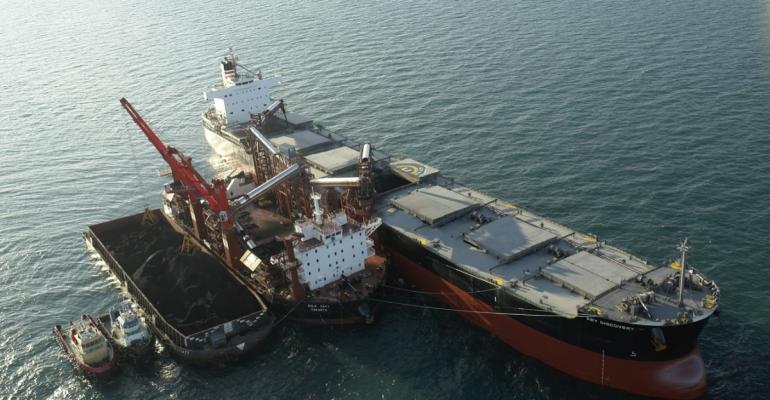Sierra Leone, Ghana and Guinea were noted as countries with pipeline projects and other indicators pointing to a ramp up in demand for transhippers, particularly for the export of bauxite and iron ore, said Shi.E.L.D. Operations Director Guglielmo Tersalvi.
Shi.E.L.D. already has experience in Guinea as technical, operations and crew manager for the vessel Bulk Borneo, a ship it designed and built. The ship is owned by PT ABL and loads around 35,000 tons of bauxite per day into bulk carriers.
Assigning assets to cope with new demand out of West Africa is a complex prospect, said Tersalvi.
Mobilising existing assets brings an established crew and quick deployment time, but a vessel may not be ideally suited to the requirements of a project, may need technical modifications, will have high mobilisation costs and will need time out at some point for a special survey. Newbuild vessels could be designed specifically for a project and will have five years until special survey, but will come with a high capex cost and long lead time until deployment.
One particular difficulty in modifying existing vessels is that most are designed for transhipment of coal out of Indonesia, where West African transhipments will be bauxite and irone ore. Bauxite in particular is double the weight of coal and is a sticky substance in humid conditions, and so modifications are necessary to equipment speeds, hopper shapes and other machinery to ensure optimal operation.
Shi.E.L.D. has developed a modular design for a transhipment vessel to reduce costs and deployment times, whereby addition cranes and equipment can be added to a vessel over time with minimal disruption, increasing capacity as a project ramps up. While the company has no firm plans for newbuildings to serve West Africa’s increasing demand, it does have designs ready to use should a project require it.
The company said it was proud of its 99% crew retention rate, and with the technical knowledge of its crews central to its operations it had tried to go the extra mile for its staff during the pandemic. Regular calls between senior staff ashore and crewmembers were arranged and the company made sure there was opportunity for crew to video call friends and family. Adjustments to logistics ensured that more and better food was available to crew, and the company arranged for multiple deliveries of treats from home, an initiative it said was well received by crewmembers.
COVID safety measures continue to be followed onboard, and Shi.E.L.D. said that through regular testing and strict quarantining practices it had managed to prevent any cases on its vessels and identified only one case in a crewmember due to join a vessel which was handled ashore.
Copyright © 2024. All rights reserved. Seatrade, a trading name of Informa Markets (UK) Limited.
Add Seatrade Maritime News to your Google News feed.  |

